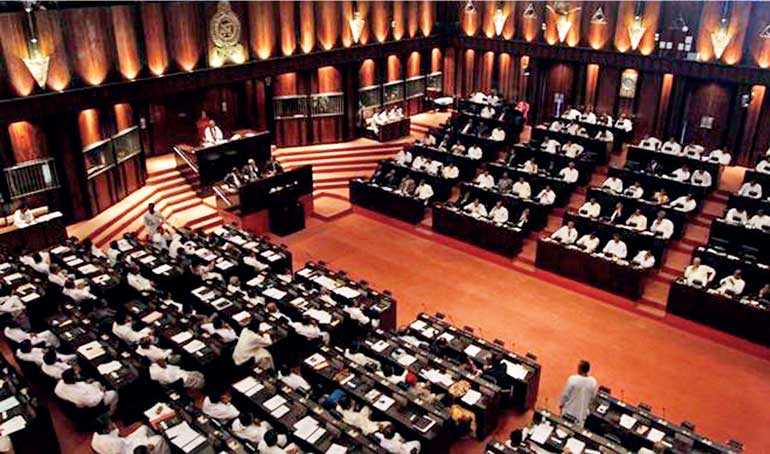Wednesday Feb 11, 2026
Wednesday Feb 11, 2026
Thursday, 13 June 2019 00:00 - - {{hitsCtrl.values.hits}}

Sri Lankans, last week, saw a different side to Parliament - of what it is capable of doing, and meant to do, apart from providing the public with endless entertainment with chili powder and butter knives. Rather than getting at each other’s throats, the ruling party and the Opposition came to a consensus - that it is time to set aside differences, political, racial, religious or otherwise, and journey hand in hand to achieve a better future for Sri Lanka.
At a special meeting of the Select Committee of Parliament to Study and Report to Parliament its Recommendations to Ensure Communal and Religious Harmony in Sri Lanka, comprising 24 Members of Parliament and chaired by Speaker Karu Jayasuriya, the two sides agreed to a common consensus in formulating policies of national importance to bring about sustainable peace, social cohesion, and reconciliation. This was indeed a unique milestone for Parliament, and for Sri Lanka, in our journey towards that elusive reconciled society. 
Making it even more special, Prime Minister Ranil Wickremesinghe and Opposition Leader Mahinda Rajapaksa were seen comfortably seated side by side, actively contributing and nodding enthusiastically to the recommendations of the Select Committee, read out by Speaker Karu Jayasuriya, on bringing about sustainable peace in the country. There was a general feeling among participants on the urgency with which the Select Committee recommendations need to be implemented.
Moreover, it was a milestone achievement for the Select Committee that day, when ruling and Opposition leaders, as well as the line Ministers and Committee members, re-endorsed the Diyawanna Declaration launched after the 21 April Easter Sunday attacks. This is a set of recommendations on the role of political leadership in the roadmap to sustainable peace. One would have thought that this would leave some faces blushing, but the enthusiasm flowed throughout the meeting. If the recommendations are implemented without a hitch, more Sri Lankans can abandon their ambitions to search for greener pastures overseas. That responsibility now lies with the line Ministries, on how well-coordinated the implementation plan is, and how efficient and skilled the implementing officers would be. The Select Committee recommendations were not something that came out of thin air overnight. It included careful planning, months of deliberations, and incorporating public views through the meetings and Regional Conferences of the Select Committee in Kandy, Ampara and Galle. The next Regional Conference is in Kurunegala on 17 June, and in Vavuniya in July. The Committee was appointed on 7 September 2018, in the backdrop of ethnic violence in Ampara and Kandy in 2018, Galle in 2017, and Kalutara in 2014, as well as other racially-motivated incidents, taking into cognizance the full-scale destruction such violence engenders. As such, the recommendations were homegrown and extracted from the people in the affected areas, in keeping with the Committee’s principle to consult directly with communities.
The Committee has also recognised that incidents of racial violence have often gone beyond redemption because prompt action had not been taken by the law enforcement machinery. Thus, amendments to Police Ordinance and Penal Code on hate speech, and the setting up of a special unit in this regard was also discussed. Coincidentally, Cabinet approval was granted on the same day of the Committee meeting to make amendments to the Penal Code and the Criminal Procedure Code, enabling to impose a fine or imprisonment to those guilty.
Sri Lankans have witnessed many national level policies come and go, along with changes to the country’s political landscape. Therefore, doubts about the life of this Select Committee and its implementation plan could certainly arise. However, since the Select Committee is established under a Gazette in Parliament, this Committee would continue regardless of political changes. In addition, if consensus is received for this Committee to become a Sectoral Committee, proper checks and balances would be in place, making the process transparent, productive and democratic.
The participants acknowledged the implementation plan to be viable, as it engaged with experiences and adjusted to the Sri Lankan context. For example, considering the opposition on the earlier proposal to admit children of other religions to leading schools, the Committee recognised possible backlashes, and agreed to implement the trilingual amity schools concept, and to regulate admissions only in newly established State schools, to reflect a percentage of up to 20% of students from other religions.
The Education Ministry, especially, has a great responsibility in the implementation plan, as the Committee rightfully identified that the best place to foster communal harmony is the school. The recommendations heavily weighed on reforms in the education sector, insisting that ideas of peace and reconciliation be instilled in schoolchildren island-wide. For this, schoolchildren are encouraged in comparative learning, and celebrating cultural diversity together. The Ministry of Education is tasked with drafting a policy to ensure that schools in cosmopolitan urban areas are not limited to a single language or religion. On a point raised by Eelam People’s Democratic Party (EPDP) leader and MP Douglas Devananda, Education Minister Akila Viraj Kariyawasam confirmed that changes to the Tamil history syllabus with accurate information is at the printing stage, and that the new syllabus will be out in January 2020 - a sign that the education sector is on the right path in this regard.
Of course, the Ministry of National Integration, Official Languages, Social Progress and Hindu Religious Affairs has an equal weight in the implementation process, as it needs to coordinate between ministries. Minister Mano Ganesan highlighted that the two-way language learning of Sinhala and Tamil would be increased with the support of the Education Ministry, and steps would be taken to strengthen the programs already in schools. However, the lack of language teachers in schools is a hindrance, as over 6,000 vacancies exist countrywide. The Education Minister said that at present, training is ongoing for 1,300 teachers of Sinhala, Tamil and English, which is hardly sufficient. The importance of learning the Arabic language was also raised. As such, it is clear that the implementation of the Committee recommendations would not be a quick fix but a long-term process, which needs the commitment of Government officials even after possible changes in the country’s political landscape.
The Ministry of National Integration has already established Coexistence Societies (CES) at Grama Niladhari division level, to promote reconciliation and coexistence at community level and to address inter- and intra-ethnic tensions. This enables multi-ethnic communities to engage constructively in the reconciliation process, and strengthens community-driven initiatives and networks to promote social cohesion. However, the capacities of some CES officers are questionable, and authorities must think of innovative ways for the CESs to engage and deliver expected outcomes.
Ruling and Opposition leaders, as well as the line Ministers and Committee members, re-endorsed the Diyawanna Declaration launched after the 21 April Easter Sunday attacks. This is a set of recommendations on the role of political leadership in the roadmap to sustainable peace. One would have thought that this would leave some faces blushing, but the enthusiasm flowed throughout the meeting. If the recommendations are implemented without a hitch, more Sri Lankans can abandon their ambitions to search for greener pastures overseas. That responsibility now lies with the line Ministries, on how well-coordinated the implementation plan is, and how efficient and skilled the implementing officers would be.
The Education Ministry, especially, has a great responsibility in the implementation plan, as the Committee rightfully identified that the best place to foster communal harmony is the school. The recommendations heavily weighed on reforms in the education sector, insisting that ideas of peace and reconciliation be instilled in schoolchildren island-wide. For this, schoolchildren are encouraged in comparative learning, and celebrating cultural diversity together. The Ministry of Education is tasked with drafting a policy to ensure that schools in cosmopolitan urban areas are not limited to a single language or religion.
The Committee has also recognised that incidents of racial violence have often gone beyond redemption because prompt action had not been taken by the law enforcement machinery. Thus, amendments to Police Ordinance and Penal Code on hate speech, and the setting up of a special unit in this regard was also discussed. Coincidentally, Cabinet approval was granted on the same day of the Committee meeting to make amendments to the Penal Code and the Criminal Procedure Code, enabling to impose a fine or imprisonment to those guilty. The urgency of this is clear, seeing public behaviour and the way most social media users are being bombarded with messages of hate. However, the dangers associated with criminalising hate speech need to be considered, as this could easily lead to political games.
On another positive note, none of the diverse participants opposed the sensitive issue of regulating the construction of religious structures, statues and places of worship, as recommended by the committee. Opposition Leader Mahinda Rajapaksa added that in doing so, the size of the population of sectors within religions must be taken into account. Also, consensus was received on recruiting those of other ethnicities into the Police force to ensure better access. The recommendations included the establishing of a Race Relations Board, with funds and authority to look into problems that affect religious harmony, or alternatively, a sub-Committee under the Human Rights Commission to deal exclusively with complaints of communal incitement and violence, which will allow for investigations to be carried out within the ambit of the law, initiating criminal proceedings. The Ministry of Law and Order has to ensure that laws are enforced uniformly with no reference to ethnic or religious identity.
It was also encouraging when Acting Inspector General of Police C. D. Wickramaratne assured that a special unit trained to handle racial tensions would be set up immediately under the Special Task Force, as per the Committee recommendation. This will have an equivalent number of members from different ethnic and religious groups, and be the first to be called in an event of communal tensions. Contingents would be stationed in identified ‘hot spots’ with a history of communal antagonism, but will perform general Police duties during normal times. With this, it is hoped that issues would be addressed immediately before causing national level tensions.
The participants also discussed the issue of personal laws vis-à-vis the country’s general laws. TNA MP M.A. Sumanthiran rightfully pointed out that if personal laws are allowed to be practiced, such laws should subject to rules of law on equality and democracy, thus ensuring uniformity.
Sri Lankans have witnessed many national level policies come and go, along with changes to the country’s political landscape. Therefore, doubts about the life of this Select Committee and its implementation plan could certainly arise.
However, since the Select Committee is established under a Gazette in Parliament, this Committee would continue regardless of political changes. In addition, if consensus is received for this Committee to become a Sectoral Committee, proper checks and balances would be in place, making the process transparent, productive and democratic.
The writer is an independent journalist working in the area of social cohesion and reconciliation. She has a Master’s degree in International Relations from Deakin University, Australia.